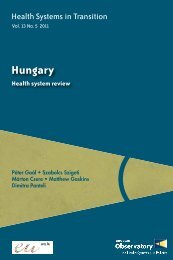Canada - World Health Organization Regional Office for Europe
Canada - World Health Organization Regional Office for Europe
Canada - World Health Organization Regional Office for Europe
Create successful ePaper yourself
Turn your PDF publications into a flip-book with our unique Google optimized e-Paper software.
<strong>Health</strong> systems in transition <strong>Canada</strong> 27<br />
subsidies <strong>for</strong> long-term care. However, lacking any national principles or federal<br />
funding, these initiatives varied considerably across the country, depending on<br />
the fiscal capacity and policy ambitions of individual provinces and territories.<br />
Table 2.1<br />
Chronology of the evolution of public health care in <strong>Canada</strong>, 1946–1984<br />
1946 Federal health insurance proposals rejected by majority of provinces in Dominion-Provincial<br />
Reconstruction Conference<br />
1947 Saskatchewan implements universal hospital insurance<br />
1948 Federal health minister introduces Hospital Grants Program and British Columbia implements universal<br />
hospital insurance (British Columbia Hospital Insurance Services)<br />
1950 Alberta introduces a provincially subsidized but municipally administered and financed hospital insurance<br />
1955 Canadian Medical Association passes resolution officially opposing universal health care<br />
1957 Federal government enacts the Hospital Insurance and Diagnostic Services Act that cost-shares hospital<br />
insurance with provinces<br />
1961 Federal government establishes the Royal Commission on <strong>Health</strong> Services (Hall Commission) to examine<br />
feasibility of national medical care insurance<br />
1962 Saskatchewan implements universal medical care insurance after a province-wide, 23-day doctors’ strike<br />
1963 Alberta Government introduces alternative to Saskatchewan’s universal plan based on subsidizing purchase<br />
of private insurance plans<br />
1964 Hall Commission report recommends universal medical care insurance based on Saskatchewan model<br />
1965 British Columbia introduces multi-payer medical care insurance involving non-profit-making<br />
insurance carriers<br />
1966 Federal government introduces Medical Care Act to cost-share single-payer universal medical care<br />
insurance with provincial governments<br />
1968 Implementation of universal medical care insurance on national basis through federal cost-sharing:<br />
Saskatchewan and British Columbia qualify; followed by Alberta, Manitoba, Ontario, Nova Scotia and<br />
Newfoundland in 1969, Quebec and Prince Edward Island in 1970; and New Brunswick in 1971<br />
1974 Government of <strong>Canada</strong> publishes Lalonde Report on factors beyond medical care such as lifestyle,<br />
environment and biology that determine health outcomes<br />
1977 Established Programs Financing (EPF) with block transfer replaces federal cost-sharing with provinces<br />
<strong>for</strong> medicare<br />
1980 Hall’s medicare check-up report on medicare to federal government concerning impact of user fees<br />
and extra billing<br />
1984 Federal government, led by <strong>Health</strong> Minister Monique Bégin, introduces the <strong>Canada</strong> <strong>Health</strong> Act which<br />
discourages extra billing and user fees <strong>for</strong> physician and hospital services<br />
During the same period, the federal government initiated much new thinking<br />
concerning the basic determinants of health beyond medical care, including<br />
biological factors and lifestyle choices, as well as environmental, social and<br />
economic conditions. In 1974, the Canadian Minister of <strong>Health</strong>, Marc Lalonde,<br />
summarized this new approach in a report – A New Perspective on the <strong>Health</strong><br />
of Canadians (<strong>Health</strong> and Welfare <strong>Canada</strong>, 1974). Emphasizing the upstream<br />
determinants of health, the Lalonde Report influenced subsequent studies<br />
and provided some of the intellectual foundation <strong>for</strong> the “wellness” re<strong>for</strong>ms<br />
introduced by provincial governments in the early 1990s (Boychuk, 2009).
















